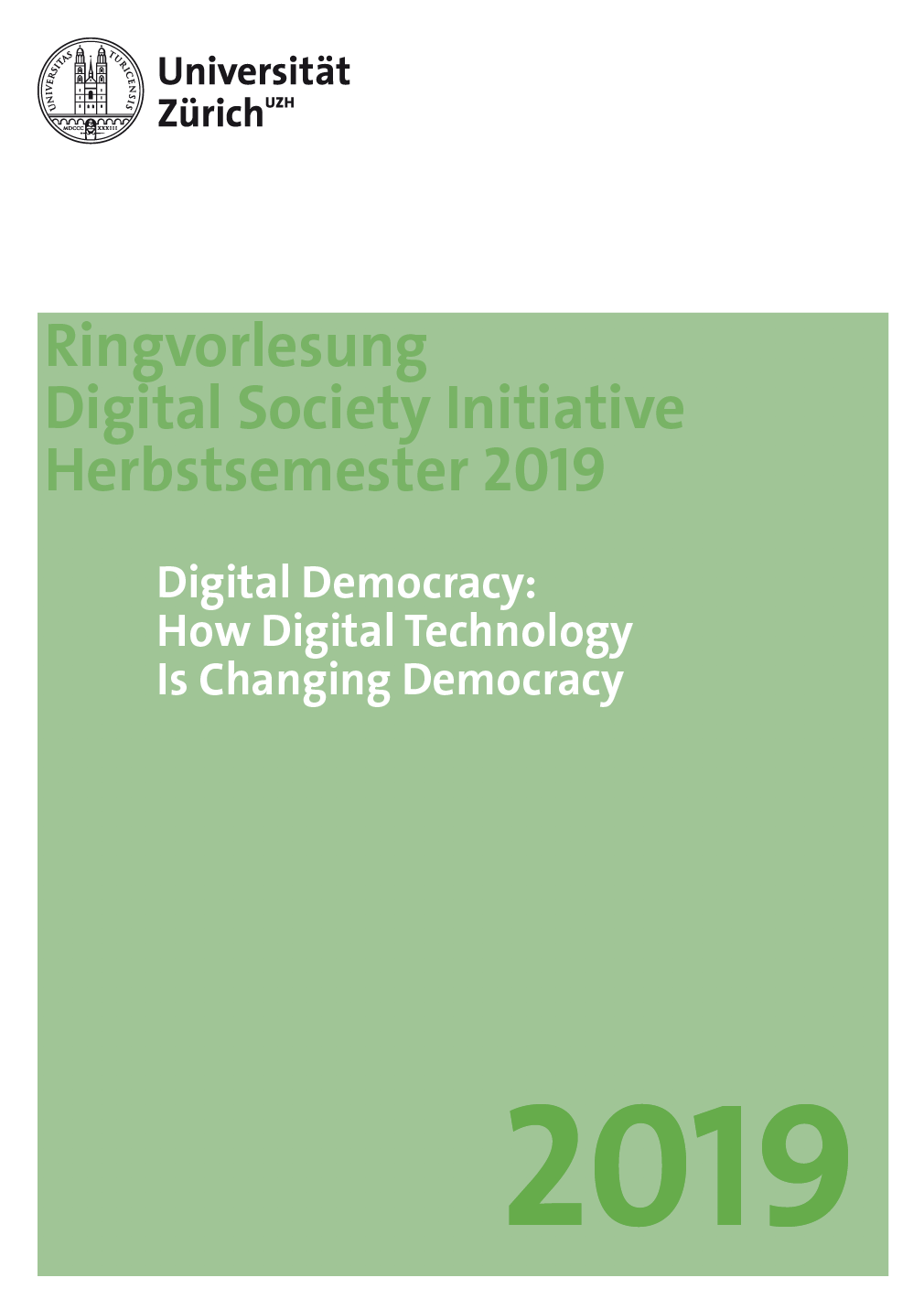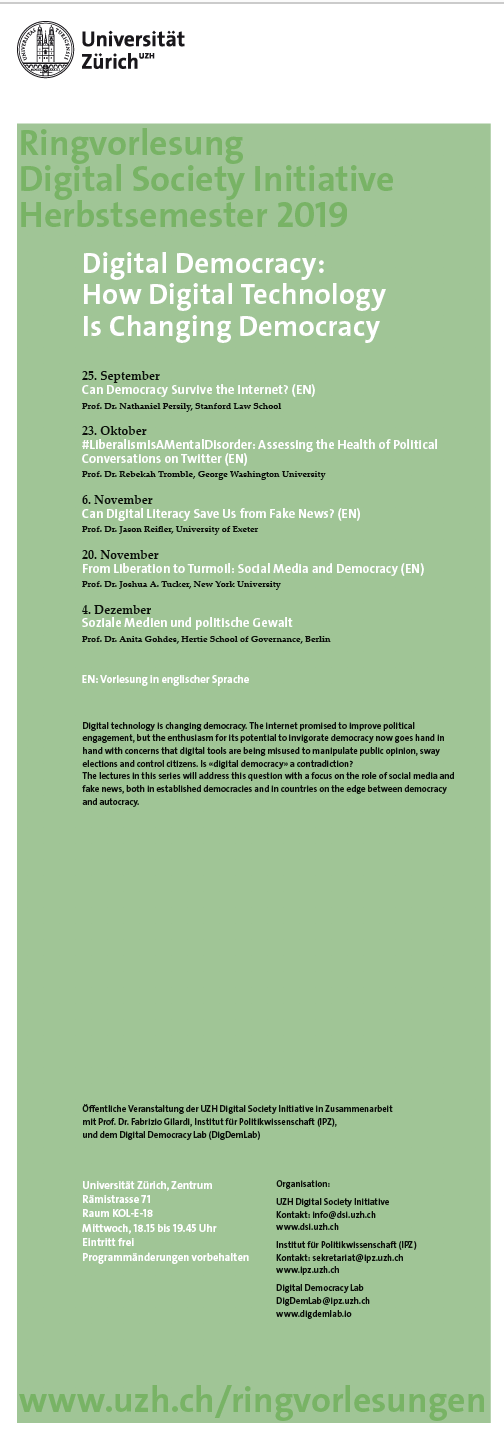DSI Ringvorlesung "Digital Democracy: How Digital Technology Is Changing Democracy"
Im Herbstsemester 2019 findet die zweite Ringvorlesung der Digital Society Initiative statt. Diesmal zum Thema "Digitale Demokratie". Wir freuen uns, auf inspirierende Vorträge unser Referenten aus den USA, Vereinigten Königreich und Deutschland!
Die Vorträge finden mehrheitlich in englischer Sprache statt. Alle Vorträge finden statt jeweils am Mittwoch von 18.15-19.45 Uhr an der Universität Zürich, Rämistrasse 71, KOL-E-18.
Der Eintritt ist kostenlos, es ist keine Anmeldung nötig.
Digitale Demokratie: Wie digitale Technologien die Demokratie verändern
Die digitale Technologie verändert die Demokratie. Das Internet versprach einst, das politische Engagement zu verbessern, aber die Begeisterung für sein Demokratisierungspotenzial geht nun mit der Sorge einher, dass digitale Instrumente missbraucht werden, um die öffentliche Meinung zu prägen, Wahlen zu beeinflussen und Bürger zu kontrollieren. Ist "Digitale Demokratie" ein Widerspruch?
Die Vorträge dieser Reihe befassen sich mit dieser Frage und konzentrieren sich auf die Rolle von Social Media und Fake News, sowohl in etablierten Demokratien als auch in Ländern, die sich auf dem schmalen Grat zwischen Demokratie und Autokratie befinden.
VERGANGENE REFERATE
25. September
Can Democracy Survive the Internet? (Vortrag in Englisch)
Prof. Dr. Nathaniel Persily (PDF, 74 KB), Stanford Law School, Stanford (USA)
Abstract (in Englisch):
Following the 2016 US Presidential Election and successful Brexit referendum, what had largely been a utopian appraisal of the Internet's potential for democracy has turned dark and pessimistic. Hopes that "cheap speech" could enable the less resourced to compete against rich and establishment voices have been replaced with fears of "fake news," bots, hate speech, and foreign election meddling. In this talk and accompanying paper, Professor Nate Persily of Stanford Law School explains how the most democratic features of the internet are what threaten democracy. In particular, a central tenet of free speech jurisprudence -- that the free marketplace of ideas is the best test for truth -- has come under great stress in the Internet age. The velocity, virality and volume of internet communication combines with the privileging of anonymous speech, the self selection into news echo chambers, the power of a few Internet monopolies, and the erosion of state sovereign control of election campaigns to create a speech and electoral environment of unprecedented complexity. Persily describes the reform options (the "7 Ds of reform") for governments, platforms, and civil society, most of which challenge fundamental notions of freedom of expression: Deletion or Demotion of content, Disclosure of its provenance, Delay in publication, Dilution of bad content with good, Distraction of audiences, and Deterrence of bad actors. Finally, he explores the challenges to democracy posed by future technological innovation, such as deepfakes, augmented and virtual reality, rising use of encrypted forms of communication, and assistive devices, such as Google Home and Amazon Echo.
23. Oktober
ANDERER VORTRAG ALS IM PROGRAMM ANGEKUENDIGT
Prof. Dr. Rebekah Tromble, (PDF, 78 KB) Georg Washington University, Washington (USA)
Abstract (in Englisch):
When the Facebook-Cambridge Analytica scandal burst into the headlines in March 2018, it cast a spotlight on tech companies’ uses and abuses of personal data. For years, platforms such as Facebook and Google had been gobbling up user data, tracking the minutiae of our daily lives, and selling or sharing that information with companies that desired our attention. Feeling the weight of public scrutiny in the wake of this scandal, many of the platforms quickly moved to restrict access to such data. But in doing so, they also shut down the main sources of information that academic scholars and other researchers once used to investigate the platforms and to hold them accountable for potential harms to democracy and members of the public. Ironically, this means that we have even less information about phenomena such as disinformation and hate speech than we did just a few years ago. In this talk I will reflect on how we might strike a better balance between respecting users’ right to privacy—which is absolutely essential—and ensuring platform transparency.
06. November
Can Digital Literacy Save Us From Fake News? (Vortrag in Englisch)
Prof. Dr.Jason Reifler (PDF, 159 KB), University of Exeter, Exeter (UK)
Abstract (in Englisch):
The internet-fueled spread of “fake news” and misinformation is a significant challenge. Interventions that are consistent with democratic values as well effective may be in short supply. One solution commonly proposed by civil society groups is teaching people digital literacy. Data from preregistered survey experiments in are used to evaluate the effectiveness of an intervention which provided “tips"' on how to spot false. This intervention — modeled after an intervention used by Facebook in 14 countries — improved discernment between mainstream and false news headlines among both a nationally representative sample in the US and a highly educated online sample in India. These effects persisted in the US study. In a less educated and less internet connected representative sample in northern India, our digital literacy intervention had little effect. These findings suggest that even brief digital literacy interventions can have important benefits when they reach an appropriate population.
20. November
From Liberation to Turmoil: Social Media and Democracy (Vortrag in Englisch)
Prof. Dr. Joshua Tucker, New York University, New York (USA)
Abstract (in Englisch):
When social media first burst onto the political scene in the early part of this decade, it was hailed as "liberation technology" because of the role it could play in spreading democratization around the globe. Within five short years, commentators instead would be asking "can democracy survive the internet?" Join Professor Joshua A Tucker of NYU's Center for Social Media and Politics (csmapnyu.org) as he explains this evolution and shares his lab's research on hate speech, fake news, and Russian trolls in the 2016 US election campaign.
04. Dezember
Soziale Medien und politische Gewalt (Vortrag auf Deutsch)
Prof. Dr. Anita Gohdes, Hertie School of Governance, Berlin (DE)
Abstract:
Von Hongkong über den Iran bis in die Strassen Beiruts scheinen Soziale Medien den Menschen neue Möglichkeiten gegeben zu haben, ihrer Unzufriedenheit Ausdruck zu verleihen und sich gegen repressive oder korrupte Regierungen zu mobilisieren. Gleichzeitig verstärken Regierungen ihre Kontrolle über den Zugang und die Deutungshoheit im Internet.
Dieser Vortrag wird sich mit der Frage beschäftigen, in welchem Masse und durch welche Mechanismen, Soziale Medien mit der Entstehung und den Dynamiken politischer Gewalt zusammenhängen. Hierbei werden wir uns genauer ansehen, ob und wie die Nutzung, Manipulation, und Zensur von Sozialen Medien im Zusammenhang mit politischer Gewalt eine Rolle spielt.


